The 2011 MacBook Air (11 & 13-inch): Thoroughly Reviewed
by Anand Lal Shimpi on July 28, 2011 3:25 AM EST- Posted in
- Apple
- Mac
- Intel
- Sandy Bridge
- MacBook Air
- Laptops
Thermals & Power Consumption
Both the 11 and 13-inch MacBook Air use the same 45W MagSafe power adapter as the 2010 models. To get an idea of how much power the platform as a whole uses I measured power using the same power brick and a fully charged battery on all three MBA systems (2 new, 1 old). I chose two high-load scenarios: Cinebench R11 and Half Life 2 Episode 2. The former is a purely CPU load while the latter is a good mix of CPU and GPU load.
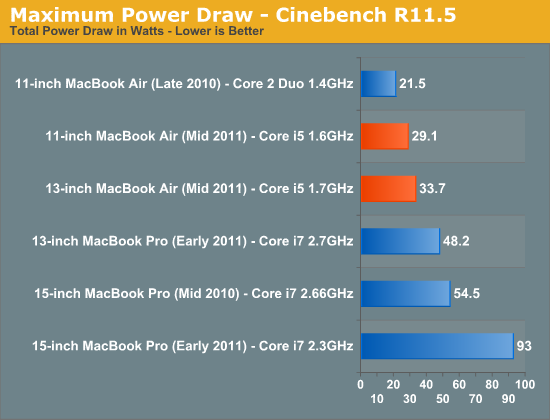
Peak power consumption has gone up significantly since last year. The 11-inch MacBook Air draws 35% more power under full load compared to its 2010 counterpart. In Cinebench R11 however, the new 11 is over twice as fast as the old one. A 35% increase in max power for a 2x increase in performance? I'll take it.
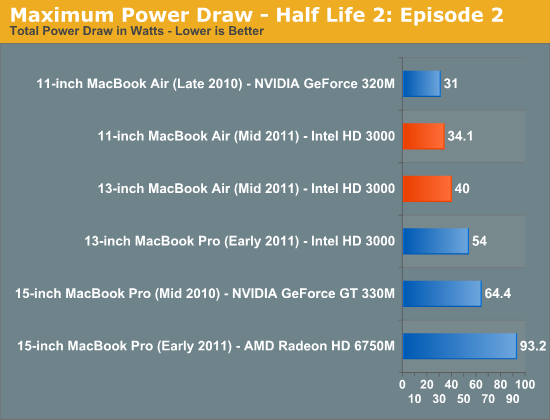
Overall power consumption isn't too bad. You're looking at under 35W for full load on the 11 and around 40W for the 13. Neither exceeds the maximum power draw of a 13-inch MacBook Pro.
How hot are the new Airs on your lap? For the most part they aren't too bad. Under a light load the fan won't spin up and you won't feel more than 31C on your lap:
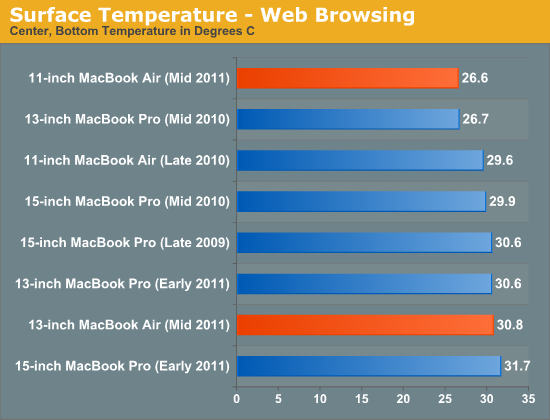
It's under load that these things can get warm. If you're just measuring surface temperature then the new 11 can hang with the 15-inch MacBook Pro:
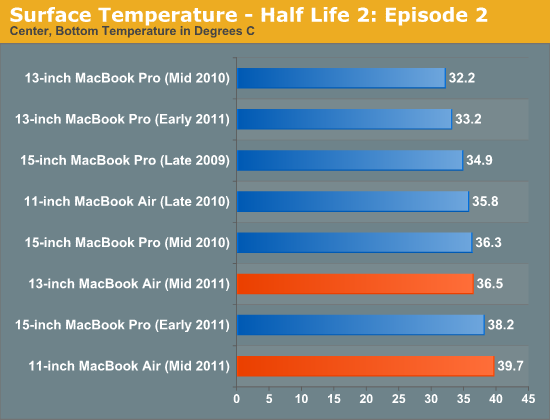
The 11-inch MacBook Air actually has it the worst. With a more cramped chassis things seem to get hotter more quickly in there compared to the 13. However max temperature is no where near as bad as the 15-inch MacBook Pro:
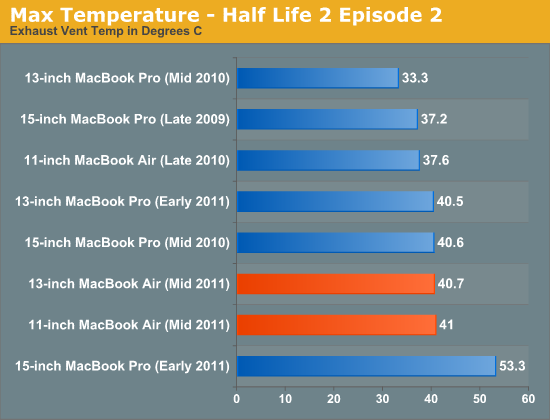
Overall the thermals seem to be in line with a 13-inch MacBook Pro, despite being confined to a much smaller chassis.










103 Comments
View All Comments
djpavcy - Thursday, July 28, 2011 - link
In your "2011 MacBook Air Lineup" table the "Cores/Threads" and "Base Clock Speed" categories are messed up.Excellent review btw
apinkel - Thursday, July 28, 2011 - link
Thanks for the review. I am very interested in the 13" MBA as it's the only ultraportable I can find that has what I consider to be the ideal resolution for a laptop display with good performance and battery life (the thinkpad x301 is a close second but there's too much of a performance sacrifce there although I prefer the ports and features on the x301).I need a windows machine... I'm just trying to find out if the MBA is a good windows only machine. I hear conflicting reports on this... I'm sure you guys are busy but if you find the time I'd love to hear your thoughts on using a MBA as windows only.
setzer - Thursday, July 28, 2011 - link
Hi Anand, you have a small typo on the specifications table:Base Clock Speed Intel HD 3000
check - Thursday, July 28, 2011 - link
From Page 4:http://www.anandtech.com/show/4528/the-2011-macboo...
"Apple has sold a USB 10/100 Ethernet dongle in the past for MacBook Air owners, but these days you can get better performance over good WiFi than you can from 100Mbps Ethernet"
I would like to see some testing that substantiates this claim.
In my experience traditional 802.11a/b/g/n can't sustain speeds anywhere near what a 100Mbit wired connection can do. Not to mention that if you are running WPA or any other encryption you take a substantial bandwidth hit.
JarredWalton - Thursday, July 28, 2011 - link
With a good router and WiFi card, and if you're in relatively close proximity to the router, 802.11n can definitely outperform 100Mbit Ethernet. If you're on the other side of the house, it will be slower, but then you'd have to run a 150 foot Ethernet cable. Now, Gigabit Ethernet is in a league of its own compared to WiFi, but we already knew that.Penti - Wednesday, August 10, 2011 - link
Just attach a 10GbE adapter to it then :) Thunderbolt does suppport this kind of expansion.Uritziel - Thursday, July 28, 2011 - link
It's not really necessary to substantiate a claim that an up-to-450Mbps standard "can get better performance" over a 100Mbps standard :\Silenus - Thursday, July 28, 2011 - link
Did you read the the rest of the review? This WAS tested. See the SSD and WiFi performance section:http://www.anandtech.com/show/4528/the-2011-macboo...
Both the 11 and 13 topped 116Mb transfers. 15 Macbook Pro and recent iMac did even better.
lyeoh - Thursday, July 28, 2011 - link
1) That's peak speed.2) That's probably for only one WiFi user with a good zero interference connection to the AP. Add another WiFi user (or ten ;) ) and the speed will drop.
Some (not all) APs also slow down everyone if a WiFi B/G user connects.
A5 - Thursday, July 28, 2011 - link
You're also not going to hit line speed on 100 Mbps networks without an optimal set of conditions. For everyday use (even with multiple users, etc), 802.11n is good enough and far easier to install a new network than 100 Mbps wired Ethernet.If you're doing a lot of the large file transfers or movie streaming, consider installing a Gigabit network though.